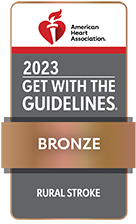People who live in rural communities live an average of three years fewer than urban counterparts and have a 40% higher likelihood of developing heart disease and face a 30% increased risk for stroke mortality — a gap that has grown over the past two decades. , Geneva General Hospital is committed to changing that.
For efforts to optimize stroke care and eliminate rural health care outcome disparities, Geneva General Hospital has received the American Heart Association’s Get With The Guidelines® - Stroke Rural Recognition Bronze award.
The American Heart Association, the world’s leading nonprofit organization focused on heart and brain health for all, recognizes the importance of health care services provided to people living in rural areas by rural hospitals that play a vital role in initiation of timely evidence-based care. For that reason, all rural hospitals participating in Get With The Guidelines® - Stroke are eligible to receive award recognition based on a unique methodology focused on early acute stroke performance metrics.
“We are proud that our team at Geneva General Hospital is being recognized for the important work we do every day to improve the lives of people in our communities who are affected by stroke, giving them the best possible chance of recovery and survival,” said Matthew Talbott M.D., FACEP, MBA, Finger Lakes Health’s Associate Chief Medical Officer, Director of Emergency Medicine and Medical Director, Stroke Center . “As a hospital in a rural community, we deal with characteristics, such as extended interfacility transportation times, and limited staffing resources. We've made it a goal to make sure those hurdles do not affect the standard of care our stoke patients receive.
“Rural communities deserve high quality stroke care. I'm proud of our team for their commitment to stroke care excellence and this achievement.”
The award recognizes hospitals for their efforts toward acute stroke care excellence demonstrated by composite score compliance to guideline-directed care for intravenous thrombolytic therapy, timely hospital inter-facility transfer, dysphagia screening, symptom timeline and deficit assessment documentation, emergency medical services communication, brain imaging and stroke expert consultation.
“Patients and health care professionals in the rural areas of the Finger Lakes face unique health care challenges and opportunities,” said Karen E. Joynt Maddox, M.D., MPH, volunteer expert for the American Heart Association, co-author on “Call to Action: Rural Health: A Presidential Advisory From the American Heart Association and American Stroke Association” and co-director of the Center for Health Economics and Policy at the Institute for Public Health at Washington University in St. Louis, Missouri. “Geneva General Hospital has furthered this important work to improve care for all Americans, regardless of where they live.”
###
About the American Heart Association
The American Heart Association is a relentless force for a world of longer, healthier lives. We are dedicated to ensuring equitable health in all communities. Through collaboration with numerous organizations, and powered by millions of volunteers, we fund innovative research, advocate for the public’s health and share lifesaving resources. The Dallas-based organization has been a leading source of health information for nearly a century. Connect with us on heart.org, Facebook, Twitter or by calling 1-800-AHA-USA1.
